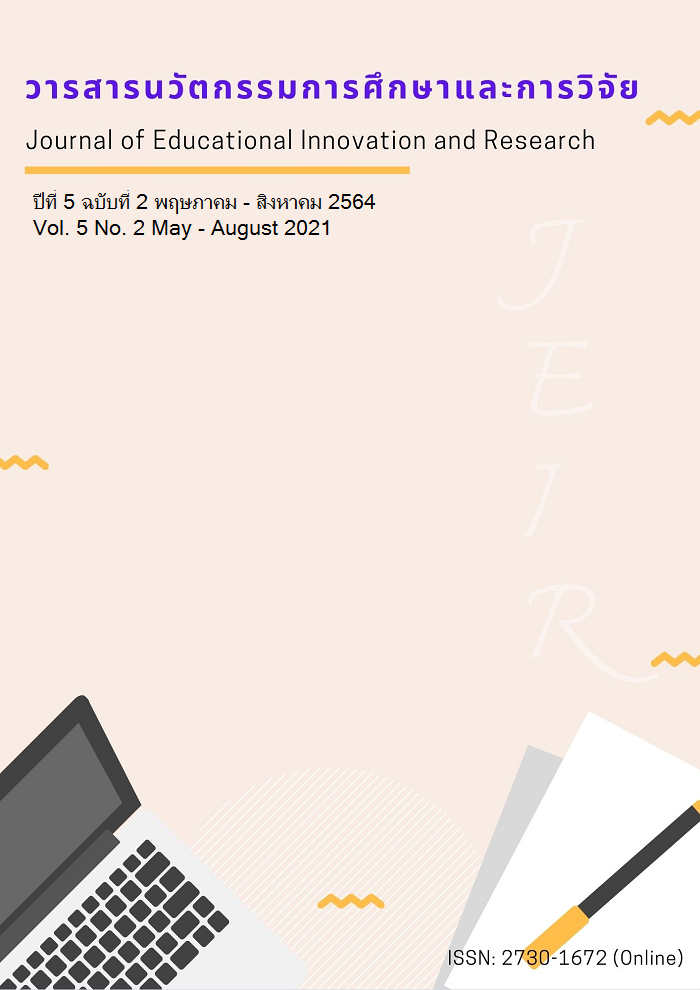Needs of Academic Staff in Science Education for Instruction in Science Education Curriculum at Graduate Students
Main Article Content
Abstract
The purposes of this article were 1) to investigate the degrees in which staff in science education reported their needs in learning and teaching at a graduate level and 2) to compare the staff’s needs in science education at a graduate level based on the different groupings of respondents. The present study was conducted using a mixed methods research design. The sample group was randomly selected. The respondents were staff in science education, school administrators, science teachers, and students in the field of science education in Bangkok and its neighboring provinces. Through the use of survey research, 18 participants (including school administrators, science teachers and students) were interviewed. One hundred respondents (including school administrators, science teachers, and students) completed the questionnaires that were distributed to them in October 2020. The interviews and questionnaires were developed by the researcher with a reliability level of .94. The results of the study show that a majority of the respondents wanted to pursue a masters degree program in science education because they wanted to improve and gain more knowledge (especially in regards to teaching and learning management which were most selected). Overall, the respondents reporting their needs in pursuing a masters degree program in science education were not different. Likewise, there was no difference across all perspectives. In conclusion, a masters degree program in science education might be considered as a way to provide knowledge in science to staff in the field as they reported that education in Thailand was not adequate. Further knowledge in science education may better improve students in science.
The findings of this study may be used to effectively design a curriculum at a graduate level in science education. They were correlated with the needs in a society.
Article Details
References
คณะกรรมการฝ่ายจัดทำหนังสือที่ระลึก. (2556). สี่สิบสองปีมหาวิทยาลัยรามคำแหง. กรุงเทพฯ : มหาวิทยาลัยรามคำแหง
ณพัฐอร บัวฉุน นฤมล ยุตาคม และพจนารถ สุวรรณรุจิ. (2559). สภาพการจัดการเรียนการสอนรายวิชาวิทยาศาสตร์เพื่อคุณภาพชีวิต หมวดวิชาศึกษาทั่วไป. วารสารวิจัยและพัฒนาวไลยอลงกรณ์ ในพระบรมราชูปถัมภ์, 11(2), 97 – 109.
ไทยเว็บอีซี่. (2563). Digital Education การศึกษาบนโลกดิจิตัล กับผู้เรียนรู้ในศตวรรษที่ 21 [บทความ]. สืบค้นเมื่อ 25 สิงหาคม 2563, จาก https://www.thaiwebeasy.com/new_it_detail.php?news_it=7
ปุณฑรารัตน์ นาชัยโชติ. (2561). แนวคิดและทฤษฎีAbraham H. Maslow. สืบค้นเมื่อ 25 สิงหาคม 2563, http://phunthararat.blogspot.com/2018/11/abraham-maslow.html
ประสาท เนืองเฉลิม. (2558). แนวการเรียนรู้วิทยาศาสตร์ในศตวรรษที่ 21. วารสารพัฒนาการเรียนการสอนมหาวิทยาลัยรังสิต, 9(1),136–154.
สุพัตรา หนูเอียด. (2559).ความต้องการของชุมชนต่อการจัดการเรียนการสอนตามหลักสูตรกระทรวงศึกษาธิการเป็นภาษาอังกฤษในโรงเรียนสังกัดเมืองพัทยา (วิทยานิพนธ์การศึกษามหาบัณฑิต). มหาวิทยาลัยบูรพา.
สำนักงานเลขาธิการสภาการศึกษา. (2560). แผนการศึกษาแห่งชาติพ.ศ. 2560 – 2579. กรุงเทพฯ : บริษัท พริกหวานกราฟฟิค จำกัด.
สำนักงานเลขาธิการสภาการศึกษา. (2560). รายงานสถิติการศึกษา ปีการศึกษา 2562 โรงเรียนสังกัดกรุงเทพมหานคร. กลุ่มงานแผนงานและสารสนเทศ ส่วนนโยบายและแผนการศึกษาสำนักงานยุทธศาสตร์การศึกษา. พระนครศรีอยุธยา: โรงพิมพ์มหาจุฬาลงกรณราชวิทยาลัย.
Greedisgoods. (2019). ERG Theory. Retrieved August 23, 2020, from https://greedisgoods.com/erg-%E0%B8%84%E0%B8%B7%E0%B8%AD/


